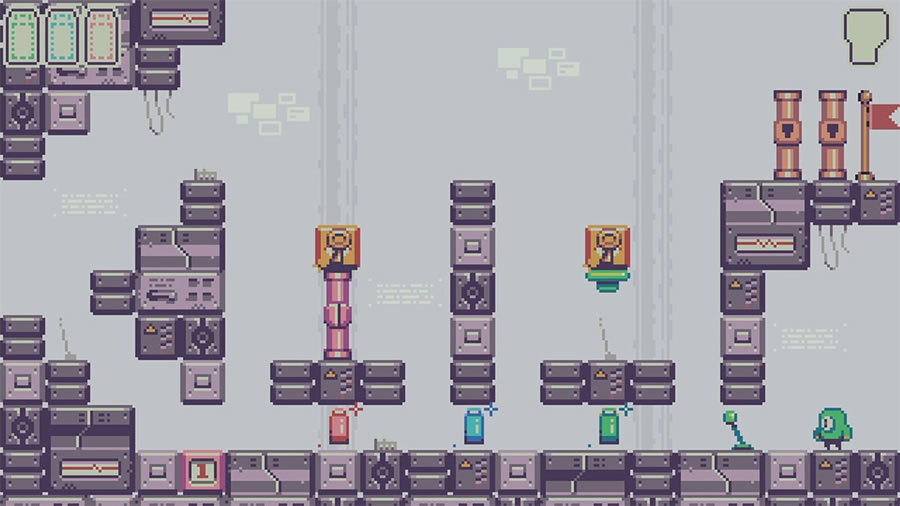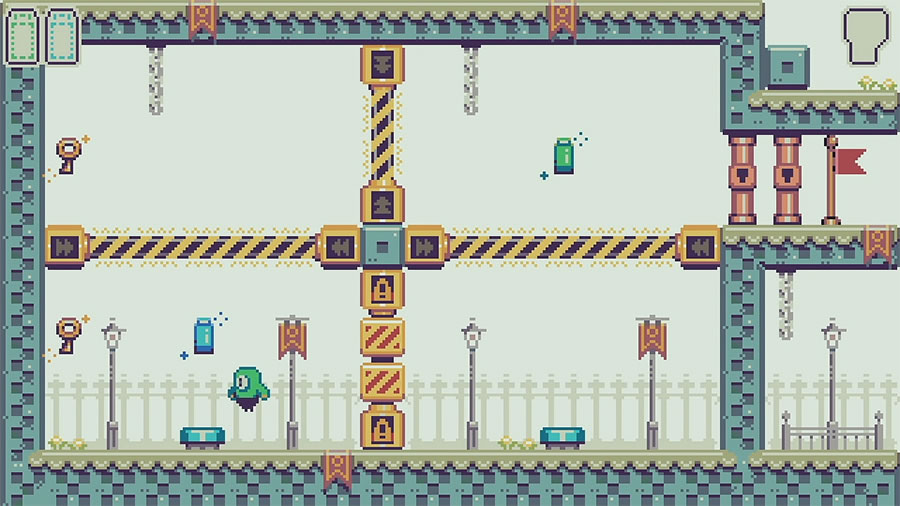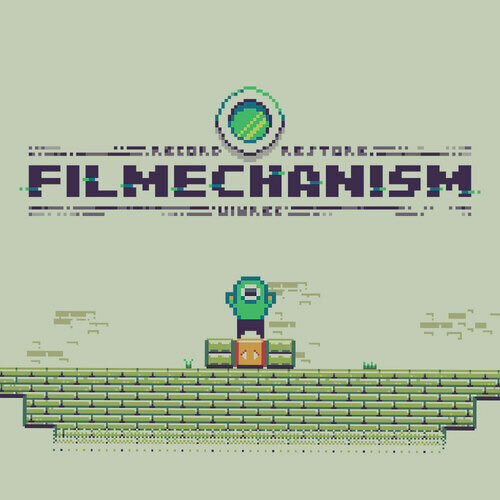- CLASSIC MAGAZINES
- REVIEW CREW
A show recapping what critics thought back
when classic games first came out! - NEXT GENERATION'S BEST & WORST
From the worst 1-star reviews to the best
5-stars can offer, this is Next Generation! - NINTENDO POWER (ARCHIVE)
Experience a variety of shows looking at the
often baffling history of Nintendo Power! - MAGAZINE RETROSPECTIVE
We're looking at the absolutely true history of
some of the most iconic game magazines ever! - SUPER PLAY'S TOP 600
The longest and most ambitious Super NES
countdown on the internet! - THEY SAID WHAT?
Debunking predictions and gossip found
in classic video game magazines! - NEXT GENERATION UNCOVERED
Cyril is back in this spin-off series, featuring the
cover critic review the art of Next Generation! - HARDCORE GAMER MAGAZING (PDF ISSUES)
Download all 36 issues of Hardcore Gamer
Magazine and relive the fun in PDF form!
- REVIEW CREW
- ELECTRONIC GAMING MONTHLY
- ELECTRONIC GAMING MONTHLY RANKS
From Mario to Sonic to Street Fighter, EGM
ranks classic game franchises and consoles! - ELECTRONIC GAMING MONTHLY BEST & WORST
Counting down EGM’s best and worst reviews
going year by year, from 1989 – 2009! - ELECTRONIC GAMING BEST & WORST AWARDS
11-part video series chronicling the ups and
downs of EGM’s Best & Worst Awards!
- ELECTRONIC GAMING MONTHLY RANKS
- GAME HISTORY
- GAME OVER: STORY BREAKDOWNS
Long-running series breaking down game
stories and analyzing their endings! - A BRIEF HISTORY OF GAMING w/ [NAME HERE]
Real history presented in a fun and pithy
format from a variety of game historians! - THE BLACK SHEEP
A series looking back at the black sheep
entries in popular game franchises! - INSTANT EXPERT
Everything you could possibly want to know
about a wide variety of gaming topics! - FREEZE FRAME
When something familiar happens in the games
industry, we're there to take a picture! - I'VE GOT YOUR NUMBER
Learn real video game history through a series
of number-themed episodes, starting at zero! - GREAT MOMENTS IN BAD ACTING
A joyous celebration of some of gaming's
absolute worst voice acting!
- GAME OVER: STORY BREAKDOWNS
- POPULAR SHOWS
- DG NEWS w/ LORNE RISELEY
Newsman Lorne Riseley hosts a regular
series looking at the hottest gaming news! - REVIEW REWIND
Cyril replays a game he reviewed 10+ years
ago to see if he got it right or wrong! - ON-RUNNING FEUDS
Defunct Games' longest-running show, with
editorials, observations and other fun oddities! - DEFUNCT GAMES QUIZ (ARCHIVE)
From online quizzes to game shows, we're
putting your video game knowledge to the test!- QUIZ: ONLINE PASS
Take a weekly quiz to see how well you know
the news and current gaming events! - QUIZ: KNOW THE GAME
One-on-one quiz show where contestants
find out if they actually know classic games! - QUIZ: THE LEADERBOARD
Can you guess the game based on the classic
review? Find out with The Leaderboard!
- QUIZ: ONLINE PASS
- DEFUNCT GAMES VS.
Cyril and the Defunct Games staff isn't afraid
to choose their favorite games and more! - CYRIL READS WORLDS OF POWER
Defunct Games recreates classic game
novelizations through the audio book format!
- DG NEWS w/ LORNE RISELEY
- COMEDY
- GAME EXPECTANCY
How long will your favorite hero live? We crunch
the numbers in this series about dying! - VIDEO GAME ADVICE
Famous game characters answer real personal
advice questions with a humorous slant! - FAKE GAMES: GUERILLA SCRAPBOOK
A long-running series about fake games and
the people who love them (covers included)! - WORST GAME EVER
A contest that attempts to create the worst
video game ever made, complete with covers! - LEVEL 1 STORIES
Literature based on the first stages of some
of your favorite classic video games! - THE COVER CRITIC
One of Defunct Games' earliest shows, Cover
Critic digs up some of the worst box art ever! - COMMERCIAL BREAK
Take a trip through some of the best and
worst video game advertisements of all time! - COMIC BOOK MODS
You've never seen comics like this before.
A curious mix of rewritten video game comics!
- GAME EXPECTANCY
- SERIES ARCHIVE
- NINTENDO SWITCH ONLINE ARCHIVE
A regularly-updated list of every Nintendo
Switch Online release, plus links to review! - PLAYSTATION PLUS CLASSIC ARCHIVE
A comprehensive list of every PlayStation
Plus classic release, including links! - RETRO-BIT PUBLISHING ARCHIVE
A regularly-updated list of every Retro-Bit
game released! - REVIEW MARATHONS w/ ADAM WALLACE
Join critic Adam Wallace as he takes us on a
classic review marathon with different themes!- DEFUNCT GAMES GOLF CLUB
Adam Wallace takes to the links to slice his way
through 72 classic golf game reviews! - 007 IN PIXELS
Adam Wallace takes on the world's greatest spy
as he reviews 15 weeks of James Bond games! - A SALUTE TO VAMPIRES
Adam Wallace is sinking his teeth into a series
covering Castlevania, BloodRayne and more! - CAPCOM'S CURSE
Adam Wallace is celebrating 13 days of Halloween
with a line-up of Capcom's scariest games! - THE FALL OF SUPERMAN
Adam Wallace is a man of steel for playing
some of the absolute worst Superman games! - THE 31 GAMES OF HALLOWEEN
Adam Wallace spends every day of October afraid
as he reviews some of the scariest games ever! - 12 WEEKS OF STAR TREK
Adam Wallace boldly goes where no critic has
gone before in this Star Trek marathon!
- DEFUNCT GAMES GOLF CLUB
- DAYS OF CHRISTMAS (ARCHIVE)
Annual holiday series with themed-episodes
that date all the way back to 2001!- 2015: 30 Ridiculous Retro Rumors
- 2014: 29 Magazines of Christmas
- 2013: 29 Questionable Power-Ups of Christmas
- 2012: 34 Theme Songs of Christmas
- 2011: 32 Game Endings of Christmas
- 2010: 31 Bonus Levels of Christmas
- 2009: 30 Genres of Christmas
- 2008: 29 Controls of Christmas
- 2007: 34 Cliches of Christmas
- 2006: 33 Consoles of Christmas
- 2005: 32 Articles of Christmas
- 2004: 31 Websites of Christmas
- 2003: 29 Issues of Christmas
- 2002: 28 Years of Christmas
- 2001: 33 Days of Christmas
- NINTENDO SWITCH ONLINE ARCHIVE
- REVIEW ARCHIVE
- FULL ARCHIVE
Filmechanism
Have you ever listened to a song you know you've heard before, but you can't quite put your finger on where? That's how I felt the entire time I played Filmechanism, the new puzzle game from first-time developer Chemical Pudding. It has one of those simple conceits that feels so familiar that I know for a fact that I've seen it somewhere else, yet, no matter how long I played, I couldn't figure out where I had seen it before. Did that ruin my enjoyment of this simple yet addicting puzzler? I guess you'll have to find out when I review Filmechanism.
This is the story of a one-eyed, green-skinned camera humanoid named Rec who loves taking pictures. In fact, he just arrived on a new star system with the goal of taking lots of snapshots. But his fun is cut short when he accidentally loses his gold film, setting him on a brain-busting adventure where the goal is to solve more than two-hundred puzzles and retrieve the gold film once and for all.
Rec's power is simple: He's able to take pictures of how things were and then revert things back to that moment in time. That means that if he takes a picture before he makes a bunch of changes to the level, he'll be able to undo all of that and see the level how it used to be. The benefit of this is that he's not included in the snapshot, allowing him to use the reversal of time to get on the other side of boxes and solve all sorts of seemingly impossible challenges.
The trick is that you're limited in pictures you can take. Rec won't be able to do much of anything until he grabs the green film, which will allow him to take (and use) a single picture. Some of the more advanced puzzles will have our alien friend grabbing blue and red film, allowing for up to three snapshots. This means that you'll need to carefully consider where and when to snap the picture and cycle between the different save states. This is one of those games that starts out incredibly easy, only to ramp up the difficulty with longer and more complicated stages.
For the most part, the action plays out like a typical 8-bit platformer. A lot of the puzzles revolve around the idea of picking up a key in order to open a locked door, which will ultimately give you access to the exit flag. Beyond that, most of the items and obstacles will be familiar to anybody who has played an old school platformer, right down to the bouncy pads, falling objects and spike pits. There are also disappearing platforms, levers that open doors, one-way electrical fields, push carts and a few other obstacles that will help mix up the later stages. I like how each of the six worlds introduce a new wrinkle to the concept and then innovates on that idea.
That said, no matter how many obstacles the game throws at you, I couldn't shake the idea that most of the puzzles are solved in the exact same way. I suspect the issue is that the central picture-taking conceit is a bit limiting, making it surprisingly obvious when and where to take each photograph. So many of the puzzles can be solved by simply getting on the other side of the boxes. The harder levels are certainly more challenging, but they rarely stray far from the usual solutions. Once you've learned the basics, you'll be able to solve eighty percent of the puzzles without any mental strain.
I couldn't help but feel like the gimmick needed an extra layer. Perhaps instead of just taking pictures, Rec could record two or three seconds of video, which you could use to solve puzzles. Or maybe some film was black and white, creating new types of objects. Those are just ideas off the top of my head, but my point is that the central conceit needed a little more fleshing out to keep it from becoming repetitive. There are so many cool ways you can use and manipulate film, and it's frustrating that this game barely scratches the surface of what is possible.
What it lacks in depth, Filmechanism more than makes up for it with content. There are more than two-hundred puzzles to solve, which will take some real doing to complete. I like how each world has different paths for the Normal, Hard and Hell difficulties, allowing you to choose between several puzzles with every step. Even the Normal path is surprisingly long, with 77 stages standing between you and the golden film.
I also like the throwback look and cute character design. This is a game that looks and feels like it could have been a long-lost platformer from the 1980s that is only coming to America for the first time. That said, I wish the backgrounds and stages were a bit more varied. Thanks to the repeating obstacles and platforms, you probably won't even notice the subtle changes to the background. That's a shame, but not enough of a problem to keep you from feeling a real sense of satisfaction every time you beat one of the stages. And it's that feeling that makes me give Filmechanism a tepid recommendation.
HOME |
CONTACT |
NOW HIRING |
WHAT IS DEFUNCT GAMES? |
NINTENDO SWITCH ONLINE |
RETRO-BIT PUBLISHING
Retro-Bit |
Switch Planet |
The Halcyon Show |
Same Name, Different Game |
Dragnix |
Press the Buttons
Game Zone Online | Hardcore Gamer | The Dreamcast Junkyard | Video Game Blogger
Dr Strife | Games For Lunch | Mondo Cool Cast | Boxed Pixels | Sega CD Universe | Gaming Trend
Game Zone Online | Hardcore Gamer | The Dreamcast Junkyard | Video Game Blogger
Dr Strife | Games For Lunch | Mondo Cool Cast | Boxed Pixels | Sega CD Universe | Gaming Trend
Copyright © 2001-2025 Defunct Games
All rights reserved. All trademarks are properties of their respective owners.
All rights reserved. All trademarks are properties of their respective owners.





































